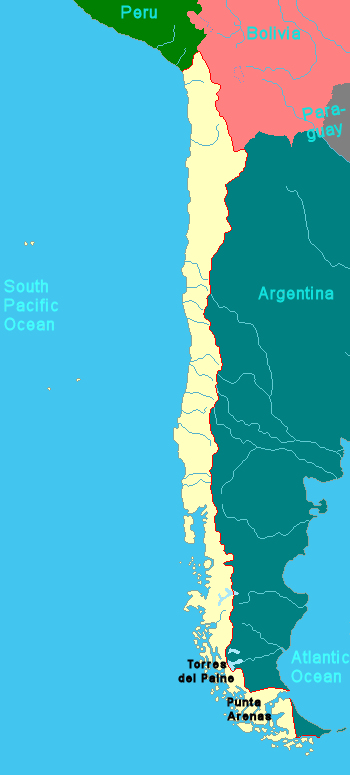Chile

Historie
About 10.000 years ago, migrating Native Americans settled in fertile valleys and coastal areas of what is present-day Chile.
Settlement sites from very early human habitation include Monte Verde, Cueva del Milodon and the Pali Aike
Crater.
The Incas briefly extended their empire into what is now northern Chile, but the Mapuche successfully resisted many attempts
by the Inca Empire to subjugate them, despite their lack of state organization.
In 1520, while attempting to circumnavigate the globe, Ferdinand Magellan discovered the southern passage now named after him,
the Strait of Magellan, thus becoming the first European to set foot on what is now Chile.
The conquest of Chile began in earnest in 1540 and was carried out by Pedro de Valdivia, who founded the city of Santiago
on 12 February 1541. Although the Spanish did not find the extensive gold and silver they sought, they recognized the agricultural
potential of Chile's central valley, and Chile became part of the Spanish Empire.
Conquest took place gradually, and the Europeans suffered repeated setbacks. A massive Mapuche insurrection that began in 1553 resulted
in Valdivia's death and the destruction of many of the colony's principal settlements.
Cut off to the north by desert, to the south by the Mapuche, to the east by the Andes Mountains, and to the west by the ocean, Chile
became one of the most centralized, homogeneous colonies in Spanish America.
Serving as a sort of frontier garrison, the colony found itself with the mission of forestalling encroachment by both the Mapuche and
Spain's European enemies, especially the British and the Dutch.
On 18 September 1810 the Government Junta of Chile proclaimed Chile an autonomous republic within the Spanish monarchy.
After these event, a movement for total independence, under the command of José Miguel Carrera, soon gained a wider following.
Spanish attempts to re-impose arbitrary rule during what was called the Reconquista led to a prolonged struggle.
On 12 February 1818 Chile was proclaimed an independent republic.
The political revolt brought little social change, however, and 19th-century Chilean society preserved the essence of the stratified
colonial social structure, which was greatly influenced by family politics and the Roman Catholic Church.
A strong presidency eventually emerged, but wealthy landowners remained powerful.
Toward the end of the 19th century, the government in Santiago consolidated its position in the south by the Occupation of
Araucanía.
The Boundary treaty of 1881 between Chile and Argentina confirmed Chilean sovereignty over the Strait of Magellan.
As a result of the War of the Pacific with Peru and Bolivia (1879–83), Chile expanded its territory northward by almost one-third,
eliminating Bolivia's access to the Pacific, and acquired valuable nitrate deposits, the exploitation of which led to an era of
national affluence.
Salvador Allende was the president of Chile from 1970 until 1973, and head of the Popular Unity government; he was the first
Marxist ever to be elected to the national presidency of a democracy.
Though the 1970 election was lawful, in August 1973 the Chilean Senate declared the Allende government to be "unlawful" in large
part due to its practice of unconstitutional expropriation of private property.
On 11 September 1973 Allende's presidency was ended by a violent military coup before he could complete a full term in office.
After the coup, Henry Kissinger told U.S. president Richard Nixon that the United States had "helped" the coup.
A military junta, led by General Augusto Pinochet Ugarte, took control of the country.
The first years of the regime were marked by human rights violations. On October 1973, at least 72 people were murdered by the
Caravan of Death.
In 2011, Chile recognized an a total number of killed, tortured or imprisoned for political reasons to about 40.000.
From the 1989 elections onwards the military had officially left the political future of the country to civilians to be elected.
In December 1993, Christian Democrat Eduardo Frei Ruiz-Tagle, led the Concertación coalition to victory with an absolute majority
of votes.
I visited Chile in november 2005.
It was part off my 24 days trip to Patagonie.
These are the places i have seen
Puerto Natales
Torres del Paine
Punta Arenas
Please let me know when you're having questions.
i would be pleased to help you.
Things to do and other tips
